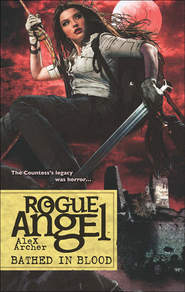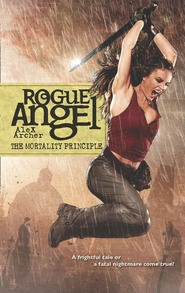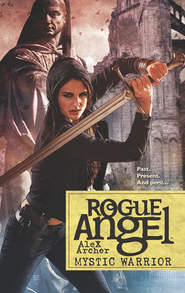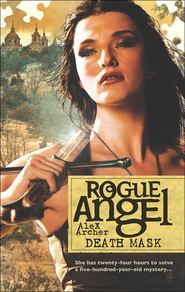По всем вопросам обращайтесь на: info@litportal.ru
(©) 2003-2025.
✖
City Of Swords
Автор
Год написания книги
2019
Настройки чтения
Размер шрифта
Высота строк
Поля
She spotted two more insomniacs when she turned on the seventh floor and started up the next flight. They stood shoulder to shoulder on the eighth-floor landing, blocking her path. Dressed in dark pants and jackets, they reminded her of the Blues Brothers. One was tall, the other shorter and stocky with a pockmarked face. The stocky one wore sunglasses, despite the stairwell’s dim lighting; that fact set her nerves tingling. Annja jogged in place on the stairs, halfway between landings, and plucked out her earbuds.
She waited for the men to move or to say something. Neither did.
“Excuse me,” she said as she reached the step just below them. They backed up, but not enough for her to reach the landing door. She didn’t like the looks of them, and hackles rose on her neck. “This is my floor,” she said, a little louder. She thought about reaching for the sword, but they hadn’t threatened her. Maybe they were with the Wales Wrunners.
The stocky one tilted his head to the side, as though he didn’t understand what Annja was saying, and so she repeated it in French. He nodded in comprehension and smiled, took a step back to accommodate her. Without warning, the tall one’s fist shot out like a piston, striking her on the shoulder. There was considerable force in the blow, and it caught her off guard.
Annja fell, arms flailing. Her legs struck the stairs and her back slammed down as she bumped and slid to the lower landing. Her head bounced hard against the tile and her vision swam. Her right ankle hurt like hell—definitely sprained, maybe broken—and she felt as if a truck had fallen on her.
She tried to get up, but her head was spinning, making the stairwell’s hospital-green paint a sickening swirl of color. As Annja retched, the tall man clomped down the steps and grabbed her by the waistband.
The sword! She felt for it with her mind, but everything was out of sync and she raced toward merciful unconsciousness.
“Where is it? In your room?” the stocky one asked in perfect English. He had the gravelly voice of a smoker. He’d taken off his sunglasses, revealing little black pig eyes. He heaved Annja around the corner to the next set of stairs and shoved. She was pitched down another flight and then another.
The tall one continued talking, but Annja was beyond making out the words. The sounds mingled with the crashing in her ears and the shock as her body hit each step. Blood filled her mouth. The sword hung beyond her reach in an otherworldly space her mind was too muddled to access.
Bending over her on the fifth-floor landing, the stocky one took Annja’s iPod and stuck it into his pocket, pausing only long enough to turn the device off. He found the hotel key card in her pants. “Let’s check her room.”
The tall man grunted in agreement as the blackness reached up to claim Annja.
Chapter 6
Archard placed the sword on the altar, first the large section and then the smaller one that Sarah had prized out of the cliff. In the gap between the two pieces, the black velvet looked like oil in the dim overhead light. A yard long, the section near the haft was jagged and reminded him of a bolt of lightning.
He bent over the blade, seeing his gray eyes reflected back at him, with faint lines visible at the corners. The years were starting to show.
“Durendal,” he said.
“Durendal,” one of two men behind him repeated in awe. “Durlindana. Durandarte. God-touched. Dr. Lawton will be pleased.”
“Indeed.” Archard pressed his fingertips to the pommel. “Most pleased.” But he couldn’t imagine that his employer’s pleasure would exceed his own. “The sword of Charlemagne’s paladin Roland.”
“Destined to be yours now,” the other man added. “You are the doctor’s lead knight.”
“I read about Roland,” Sarah said slowly. “In Dr. Lawton’s textbook. Some called him Orlando, and the sword—”
Annoyed glances from all three men made her stop.
Archard closed his eyes and prayed over the weapon. He heard the soft hiss of his own breath, faster than normal because of his excitement. The walls of this building were thick, but still the wail of a siren managed to find its way in, crescendoed. Another joined it, and then both faded to nothing. He continued to pray.
The other two tugged Sarah back to give him time alone with the sword.
“You endure,” Archard whispered, when he had finished his prayer. The name Durendal was believed to have come from the French word durer, meaning “to endure.” Despite Roland’s attempt to destroy it to keep it out of enemy hands, the blade had survived. Damaged, but it still endured....
In Italy it was called Durlindana, and in Spain, Durandarte. Just as Charlemagne had presented it to Roland, Dr. Lawton said it was to be Archard’s now. Once said to belong to the fabled Hector of Troy, it was supposed to have been forged by a mysterious Berkshire master blacksmith named Wayland. Its origin was murky, but according to the Song of Roland, somehow an angel had got hold of it and given it to Charlemagne. Did it truly have a tooth of Saint Peter inside its golden hilt? Roland touched the hilt again, holding his fingers against the warmth of the metal. A hair from Saint Denis, a piece of cloth from the Virgin Mary’s cloak and a drop of blood from Saint Basil—all those things were said to have gone into its making.
“God-touched,” Archard whispered.
And now it was his.
But was he worthy of it? And of being Dr. Lawton’s “Roland”?
Archard had memorized the Song of Roland, perhaps the oldest surviving French manuscript of any consequence. He’d been with Dr. Lawton for the past five years, coming to the scholar in much the same way Sarah had, through the university. He hadn’t been a student at first, but rather a teacher, one relatively fresh from his doctoral degree and entrenched in the religious studies department. Archard’s wife, in the history department, had suggested they attend one of Dr. Lawton’s lectures after dinner one night. He’d agreed to go because it would gain him “wife points,” which usually translated into out-of-the-ordinary sex.
The topic—religion’s influence on medieval European conflicts—held enough of an interest that Archard had stayed awake through the entire presentation. He was more fascinated by religion in its permutations in present-day society, but was nonetheless captivated by Lawton’s intensity and the way the man could hold a crowd on such an otherwise dry topic. Archard had recognized the charisma and power in Dr. Lawton, and had started attending more lectures, some with his wife, most without. Drawn like a moth.
Had he traded one addiction for another?
Archard smiled at that thought. If so, it had been a more than fair trade. A far better addiction, this.
His interest in religion had begun in high school, when his parents sent him to Avignon to seek penance for his obsession with girls. He’d gotten two pregnant before his sixteenth birthday—three, but one he’d managed to sweep under the carpet on his own. His father was well-off and paid for his indiscretions, after eliciting a promise from him to study with the order in Avignon. Archard spent the summer among the monks before deciding their lifestyle was a little too austere for his tastes. Especially since he couldn’t tamp down his interest in women.
And so come the fall he’d mixed his two fields at the university, delving into religious studies while pursuing as many girls as he could manage, given his academic work. Eventually he tried to settle down with a beautiful history major, who agreed to share a flat with him at the edge of campus. In time they married. He knew she was aware that he sometimes stepped out on her, but he wondered if she knew just how often.
And then Archard’s promiscuity became an issue with Dr. Lawton. The more time he spent with the professor, and the more he opened up about his life, the more Lawton beseeched him to change.
“Choose your penchant for flesh or choose salvation for your soul,” Archard recalled his mentor telling him after one lecture. “There isn’t room in my company for both.” Archard had attended it with a visiting student from Ireland who’d caught his fancy. Dr. Lawton said no more on the matter for several months.
The more lectures Archard attended, the more he fell under the professor’s spell. He even enrolled in some classes as a student himself, and the professor took him under his wing.
“You are my Roland,” Lawton told him on a weekend trip to the Imperial War Museum and the Tower of London in England. That night over dinner, the professor had outlined his plan, and Archard bought into it. But Dr. Lawton worried that “his Roland” could not wholly focus on their mission.
Women had always been the one chink in his armor, the one distraction that kept him from a perfect life. So Archard found a doctor in Paris who cured his sexual appetite with anti-androgen drugs. In some circles it was called chemical castration, though that was a misnomer, as he remained intact. It was a treatment the courts sometimes imposed on molesters or rapists. The drugs reduced his libido by suppressing his testosterone. Women no longer aroused him.
His wife left him...and left the university.
He’d chosen this chaste, important life over the bawdy, selfish one he’d left behind.
A good trade. A more than adequate trade.
“Much good will come of this,” Archard recited. In the Song of Roland, the paladin had used Durendal to hold a hundred thousand Muslims at bay until Charlemagne and his army could retreat into France. Archard turned and regarded the two men and Sarah. “Recovering this sword, embarking on Dr. Lawton’s quest. Nothing but good will come.”
The men nodded. Sarah wrung her hands together.
“So...who’s gonna fix the sword?” she asked. She shifted her weight back and forth on the balls of her feet and dropped her hands to her sides. “I mean, it’s not really much use with the end of it broken like that, is it?”
Archard growled softly in his throat. “Let Dr. Lawton know we’re ready, Sarah.”
She thrust out her chin at the order. A year ago he would have found her attractive and probably lured her into bed. Now she was only irritating. “Sarah...”
Chapter 7
The largest oil painting on the wall—lit museum-style in an ornate gold frame above the wainscoting—was a portrait of a well-dressed man with an abundance of black curls that fell past his shoulders. His face was all angles and planes, his eyes hooded and intense. There were other paintings, too, and all of them looked as if they’d been rendered by the Old Masters.
The room they were displayed in was opulent, the furnishings new, but not modern. Brocade cushions on white high-backed chairs. Settees, low tables, candelabras, a thick rug on the floor shot through with metallic threads. It all looked to be a carefully arranged tourist exhibit. There was even a velvet rope stretched across one section of wall to keep people from getting too close to the paintings. But this wasn’t a public exhibition. It was simply a favorite spot in Dr. Lawton’s warehouse in Paris.
He nudged back a heavy drape and peered out the window, looking down on the loading dock and at another warehouse across the street. The neighboring structures were busier—one supplied grocers, another automotive dealers. In reality the automotive supplier was a front for stolen cars coming into Europe from the United States. Dr. Lawton found the operation distasteful and intended to turn them in when he wrapped up his own business in this area.











